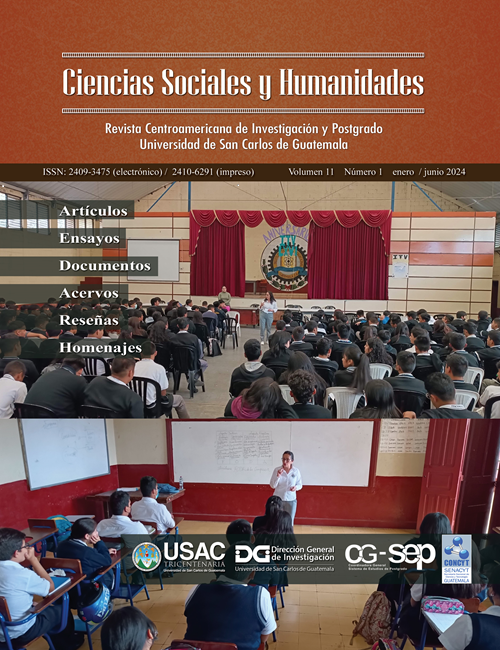Adolescent narratives about confinement due to COVID-19 and the difficulties of returning to in-person classes
DOI:
https://doi.org/10.36829/63CSH.v11i1.1670Keywords:
Life experiences, academic performance, online learning, face-to-face classes, learning difficultiesAbstract
After three years of studying from home due to the mandatory confinement by COVID-19, they returned to the classrooms. When consulting a group of middle school teachers about the difficulties of returning to face-to-face classes, they pointed out, among others, a serious delay in the expected competencies of the students. The general objective is to understand how the life and study experience during confinement relates to the difficulties in returning to face-to-face classes. The specific objectives are: (a) to describe the life experience of the students during confinement; (b) to describe the study experience during confinement; (c) to identify the difficulties faced by the students in returning to face-to-face classes; (d) to explain the students’ perception of the relationship between their life and study experience during confinement and the difficulties in returning to face-to-face classes. The applied research responds to a constructivist paradigm, qualitative approach, phenomenological design and inductive analysis; with descriptive and explanatory scope. The sampling was intentional and worked with students from the fourth diversified cycle with interviews and micro life stories. The study is important as it gives voice to the students and rescues and produces narratives for a more integral understanding of the problem, which allows to address it in a better way. The results show a weakness in the didactics of distance education and its teaching and learning strategies, in addition to intrinsic and extrinsic situations that affected life and study.
Downloads
References
Achaerandio Zuazo, L. (2012) Introducción a algunos importantes temas sobre educación y aprendizaje (2ª ed). Universidad Rafael Landívar, Editorial Cara Parens.
Aparicio-Baquen, L-C., Aparicio-Gómez, C-A., & Hernández Niño, J. F. (2021). Calidad de vida en niños, adolescentes y jóvenes durante el confinamiento obligatorio familiar en Bogotá por COVID-19. Revista Internacional De Pedagogía E Innovación Educativa, 1(2), 11-28. https://doi.org/10.51660/ripie.v1i2.35
Baqué-Reyes, G. B., Portilla-Faican, G. I. (2021). El aprendizaje significativo como estrategia didáctica para la enseñanza–aprendizaje. Polo del Conocimiento: Revista científico-profesional, 6(5), 75-86. https://polodelconocimiento.com/ojs/index.php/es/article/view/2632
Chávez Campos, M. A. (2021). Prólogo. En M. Chávez Campos (Ed.), Narrativas pedagógicas sobre la educación a distancia en las Escuelas Normales en tiempos de pandemia (pp. 19-21). Secretaría de Educación Pública.
Enríquez, A., & Sáenz, C. (2021). Primeras lecciones y desafíos de la pandemia de COVID-19 para los países del SICA. Comisión Económica para América Latina y el Caribe https://www.cepal.org/es/publicaciones/46802-primeras-lecciones-desafios-la-pandemia-covid-19-paises-sica
García Coronado, L. J., Javier Lucas, A. L., & Lozano Andrade, I. (2021). Soportar el confinamiento; malestar emocional en estudiantes de secundaria. En I. Lozano Andrade & Z. Rafael Ballesteros (Coords.), Pandemia y escuela secundaria. Reporte desde las voces profundas (1ª ed., pp. 137-160). Newton, Edición y Tecnología Educativa.
González González, M. E., Peñafiel Villarreal, R. E., Manobanda Calberto, L. I., & Cedeño Jama, K. E. (2023). Educación inclusiva, un desafío para la educación en tiempos de pandemia. LATAM Revista Latinoamericana de Ciencias Sociales y Humanidades, 4(1), 1587-1599. https://doi.org/10.56712/latam.v4i1.361
Gutiérrez Pérez, F. & Prieto Castillo, D. (1993). La mediación pedagógica. Apuntes para una educación a distancia alternativa (2ª ed.). Instituto de Investigaciones y Mejoramiento Educativo, Universidad de San Carlos de Guatemala.
Hernández-Sampieri, R., & Mendoza, C. (2018). Metodología de la Investigación. Las rutas cuantitativa, cualitativa y mixta. Editorial Mc Graw Hill.
Martínez Muñoz, M., Rodríguez Pascual, I., & Velásquez Crespo, G. (2020). Infancia confinada ¿Cómo viven la situación de confinamiento niñas, niños y adolescentes? Enclave de Evaluación y Enfoque de Derechos Humanos. https://infanciaconfinada.com
Morin, E. (1985). Introducción al pensamiento complejo. Publicaciones Morinianas
https://edgarmorinmultiversidad.org/index.php/biografia-oficial/publicaciones-morinianas.html
Naciones Unidas (2018). La Agenda 2030 y los Objetivos de Desarrollo Sostenible: una oportunidad para América Latina y el Caribe. Comisión Económica para América Latina. https://www.cepal.org/es/publicaciones/40155-la-agenda-2030-objetivos-desarrollo-sostenible-oportunidad-america-latina-caribe
Odor Rossel, O. (2021). Efectos de la pandemia COVID-19 en la educación: una revisión narrativa del desastre. Mount Scopus Journal, 1(1), 47-56.
https://doi.org/10.31219/osf.io/eqv5w
Pimienta Prieto, J. H. (2012). Estrategias de enseñanza aprendizaje Docencia universitaria basada en competencias. Editorial Pearson.
Quiroz Quiroz, A. E. (2021) Escuela y pandemia: las voces silenciadas. En I. Lozano Andrade & Z. Rafael Ballesteros (Coords.), Pandemia y escuela secundaria. Reporte desde las voces profundas (1.ª ed., pp. 115-135). Newton, Edición y Tecnología Educativa.
Ramírez, M. (2021). La responsabilidad ética de los formadores de docentes de la BENUFF: Una valoración desde la pedagogía de la Alteridad [Tesis doctoral, Universidad Cetys]. Repositorio Institucional Cetys https://repositorio.cetys.mx/handle/60000/1286
Rivera Muñoz, J. L. (2004). El aprendizaje significativo y la evaluación de los aprendizajes. Investigación educativa, 8(14), 47-52. https://revistasinvestigacion.unmsm.edu.pe/index.php/educa/article/view/7098
Saldarriaga-Zambrano, P. J., Bravo-Cedeño, G. D. R., & Loor-Rivadeneira, M. R. (2016). La teoría constructivista de Jean Piaget y su significación para la pedagogía contemporánea. Dominio de las Ciencias, 2(3 especial), 127-137. https://doi.org/10.23857/dc.v2i3 Especial.298
Sánchez-Delgado, P., Bakieva-Karimova, M., Sancho-Álvarez, C. & Jornet-Meliá, J. (2022). Estudio diferencial del rol familiar en la educación a distancia en confinamiento debido al COVID-19. Revista electrónica de investigación educativa, 24, e16. https://doi.org/10.24320/redie.2022.24.e16.5411
Uribe Sánchez, J. L. (2009). El pensamiento complejo de Edgar Morin, una posible solución a nuestro acontecer político, social y económico. Espacios Públicos, 12(26), 229-242. https://espaciospublicos.uaemex.mx/article/view/19985
Valle, A., González Cabanach, R., Cuevas González, L. M., & Fernández Suárez, AP (1998). Las estrategias de aprendizaje: características básicas y su relevancia en el contexto escolar. Revista de Psicodidáctica, (6), 53-68. https://ojs.ehu.eus/index.php/psicodidactica/article/view/87
Downloads
Published
How to Cite
Issue
Section
License
Copyright (c) 2024 Walda Paola Flores Luin, Vicky Noemí Hernández Lool

This work is licensed under a Creative Commons Attribution-NonCommercial-ShareAlike 4.0 International License.
El autor que publique en esta revista acepta las siguientes condiciones:
- El autor otorga a la Dirección General de Investigación el derecho de editar, reproducir, publicar y difundir el manuscrito en forma impresa o electrónica en la revista Ciencias Sociales y Humanidades.
- La Direción General de Investigación otorgará a la obra una licencia Creative Commons Atribución-NoComercial-CompartirIgual 4.0 Internacional.










